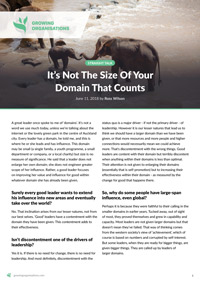Download this blog as a pdf and read it later
A great leader once spoke to me of ‘domains’. It’s not a word we use much today, unless we’re talking about the internet or the lovely green park in the centre of Auckland city. Every leader has a domain, he told me, and this is where he or she leads and has influence. This domain may be small (a single family, a youth programme, a small department or company, or a local charity) but size is no measure of significance. He said that a leader does not enlarge her own domain; she does not engineer greater scope of her influence. Rather, a good leader focuses on improving her value and influence for good within whatever domain she has already been given.
Surely every good leader wants to extend his influence into new areas and eventually take over the world?
No. That inclination arises from our lesser natures, not from our best selves. ‘Good’ leaders have a contentment with the domain they have been given. This contentment adds to their effectiveness.
Isn’t discontentment one of the drivers of leadership?
Yes it is. If there is no need for change, there is no need for leadership. And most definitely, discontentment with the status quo is a major driver – if not the primary driver – of leadership. However, it is our lesser natures that lead us to think we should have a larger domain than we have been given, or that more resources and more people and higher connections would necessarily mean we could achieve more. That’s discontentment with the wrong things. Good leaders are content with their domain but terribly discontent when anything within their domains is less than optimal. Their attention is not given to enlarging their domains (essentially that is self-promotion) but to increasing their effectiveness within their domain – as measured by the change for good that happens there.
So, why do some people have large-span influence, even global?
Perhaps it is because they were faithful to their calling in the smaller domains in earlier years. Tucked away, out of sight of most, they proved themselves and grew in capability and capacity. Most leaders are not given larger domains but that doesn’t mean they’ve failed. That way of thinking comes from the western society’s view of ‘achievement’, which of course is based on numbers and corrupted by self-interest. But some leaders, when they are ready for bigger things, are given bigger things. They are called up by leaders of larger domains.
Some of those, then, again prove themselves faithful while continuing to grow as leaders. They remain content with the new and larger but still limited domain they have and become increasingly discontent with what they see within that new domain. Some of those few, when they’re ready, are given even larger domains until, one day, the extent of their influence is huge.
Anyone with a large domain must be a good leader, right?
No! Unfortunately, much can be gained by self-promotion and selfish ambition and often is. This way I am describing is not the only way to a large domain, but it is the only ideal way, that results in significant influence for good.
So, what makes a good leader?
This morning I received something in my inbox which I encourage you to consider:
Good and effective leaders speak of their vision of a better place, and share their ideas and their convictions about how we can get there.
They listen closely to us to know whether we share their discontentment and, if we do, they call out our aspirations, help us discover what drives us, and show us a way forward. And if we don’t share their vision and discontentment, then they watch and they wait for signs in us that we are becoming compelled by a similar vision. So long as we remain within their domain, they never give up on us.
Good leaders persuade; they don’t coerce.
They encourage and enable; they don’t control or manipulate. They communicate with authenticity and vulnerability; they don’t conceal or pretend.
Good leaders are the most realistic people on earth
They accept what is true about the here and now while believing in the potential of a better future. Leaders start movements, however small, and great good is done as a result.
Final thoughts
While our leadership core (our character, ethics, morals, values, calling) shouldn’t change with the shifting sands of fashion and fads, our strategies and methods must always be under review and constantly flexing to meet the challenges we confront within our own given domains, whatever their size.

ABOUT THE AUTHOR
Ross Wilson is an Organisational Performance Consultant and Managing Director of Growing Organisations. For more information about leading your domain or to discuss your business goals, contact us today.
E: ross.wilson@growingorganisations.com | T: 021 152 8400







